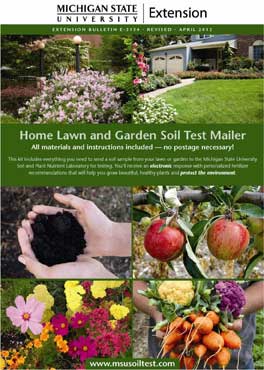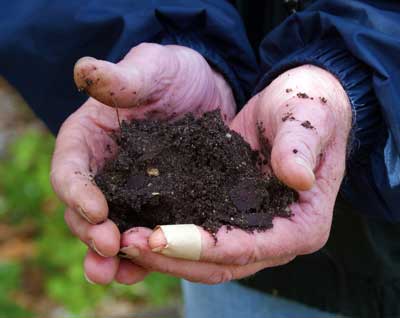Smart gardeners build soil fertility to produce healthy plants
Build up your soil by taking a soil test to determine nutrient requirements, adding organic matter and planting cover crops.
Many gardeners begin the New Year thinking about possibilities. The garden plan is conceived and committed to paper in the hopes of having the best vegetable or flower garden ever. Seed varieties will be carefully selected and ordered. Tools are sharpened, fertilizers purchased, hoses and drip irrigation supplies are repaired and excited garden club members discuss their strategies with like-minded friends. It is a good gardening practice to develop a plan to insure that your crops thrive and yield abundant fruits, but smart gardeners will not forget to include a soil building program as part of their overall approach to gardening.
 As plants grow, they remove various nutrients from the soil to carry out various physiological processes. Most gardeners will tell you they generally apply some fertilizer every year, but the majority of these products provide only nitrogen (N), phosphorous (P) and potassium (K). It is also important to know how much of these nutrients are required for optimal plant growth. To determine the NPK requirements, a soil test is needed. You can obtain a Michigan State University Extension Soil Test Kit Self-Mailer by visiting the MSU Extension Bookstore.
As plants grow, they remove various nutrients from the soil to carry out various physiological processes. Most gardeners will tell you they generally apply some fertilizer every year, but the majority of these products provide only nitrogen (N), phosphorous (P) and potassium (K). It is also important to know how much of these nutrients are required for optimal plant growth. To determine the NPK requirements, a soil test is needed. You can obtain a Michigan State University Extension Soil Test Kit Self-Mailer by visiting the MSU Extension Bookstore.
Nitrogen, phosphorous and potassium are not the only nutrients plants need for growth. They also require calcium, magnesium, sulfur, boron, manganese, chlorine, iron, zinc, copper and molybdenum, all of which they usually get from the soil. If any of the nutrients are in short supply, plants can develop deficiencies and more serious abnormalities such as misshapen fruits. Some soils are naturally low in certain minerals while others may have been reduced by growing crops repeatedly in the same area without replacement.
One of the best ways to “build up” your soil is to add organic matter. One source is compost, which can be made from grass clippings, tree leaves and kitchen waste such as salad trimmings, potato peels and other vegetable waste. Sawdust from untreated wood, pine needles and animal manures from chickens, cows, horses, goats, lambs and other herbivores (non-meat eating animals) can also be used. Animals require the same nutrients and minerals as plants do. When a cow consumes plants, the majority of the nutrients pass right through the animal and become available for plants to use.
Another way to increase soil organic matter levels is to plant cover crops such as alfalfa, clover, beans, peas or vetch. These legumes provide some nitrogen to plants via an association with certain bacteria that colonize the roots and are able to convert nitrogen from the air into a usable form for plants. Other cover crops send roots down deep in the soil to recover nutrients that may be out of the root zone of some vegetables and flowers. Some cover crops are grown primarily for the amount of organic matter that will be added to the garden when they rot. The organic matter not only recycles the nutrients, but will improve the water-holding capacity of the soil.
 The soil’s ability to hold and release nutrients for plant use is also improved by increasing the organic matter content. As the organic matter decomposes, bacteria and earthworm levels will increase to aid in the process. When earthworms consume organic matter, their waste releases nutrients that are immediately available for plant use.
The soil’s ability to hold and release nutrients for plant use is also improved by increasing the organic matter content. As the organic matter decomposes, bacteria and earthworm levels will increase to aid in the process. When earthworms consume organic matter, their waste releases nutrients that are immediately available for plant use.
Micronutrients such as boron, manganese and molybdenum are needed in very small amounts, but are not found in basic fertilizer mixes. Most gardeners generally don’t monitor or think about these nutrients unless plants develop problems such as hollow heart in broccoli, which is caused by a boron deficiency. Some of these nutrients can be purchased at a local farm elevator. Micronutrient levels in the soil can also be increased by using liquid fertilizers that contain micronutrients or by applying various animal manures.
A soil building fertility program is a lifelong endeavor and if you need additional assistance, contact your local MSU Extension horticulture educator by calling 888-678-3464.
For more information on a wide variety of smart gardening articles, or to find out about smart gardening classes and events, visit the Gardening in Michigan website.
Additional resources



 Print
Print Email
Email



